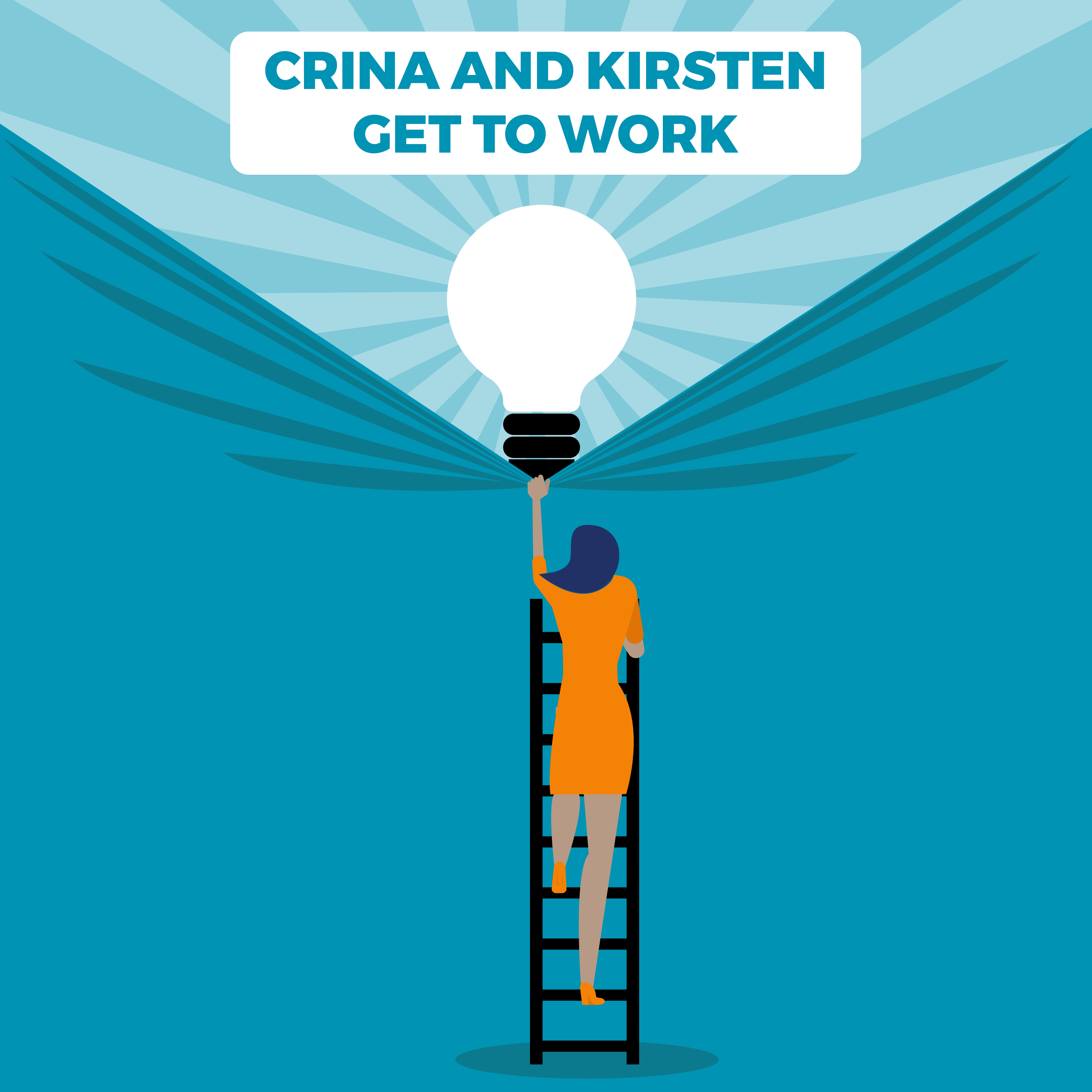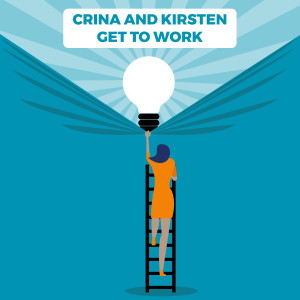Crina and Kirsten Get to Work

We have one single mission: Help women find ease, meaning and joy at work and in life. We use our experiences as business owners, entrepreneurs, mentors and inspirational leaders to explore topics that all working women care about: shitty bosses; smashing the patriarchy; balancing work and life; navigating change and getting what you want! We guarantee that you will be entertained and inspired... promise!
We have one single mission: Help women find ease, meaning and joy at work and in life. We use our experiences as business owners, entrepreneurs, mentors and inspirational leaders to explore topics that all working women care about: shitty bosses; smashing the patriarchy; balancing work and life; navigating change and getting what you want! We guarantee that you will be entertained and inspired... promise!
Episodes
Episodes



Friday Jan 23, 2026
Friday Jan 23, 2026
Emotions are not simple cause-and-effect reactions to events, but responses filtered through the stories your mind tells. Your thoughts act as a middleperson between what happens and how you feel, which means distorted thinking can create distorted emotions that don’t actually match reality.
Emotions involve your nervous system, body sensations, thoughts, and sometimes outward behavior; they are adaptive signals, not “good” or “bad.” The intensity, duration, and context of an emotion matter: how long it lasts, how strong it is, and how meaningful the situation is all shape whether your reaction fits the moment.
Cognitive psychologists like Aaron Beck and Albert Ellis showed that emotions are driven by interpretations of events, not the events themselves, which means your feelings often reflect your thoughts about reality more than reality itself. When those interpretations are biased or extreme, your emotions become “amplified,” turning manageable concern into overwhelming dread and often driving unhelpful behaviors at work and in relationships.
The seven emotional amplifiers
All‑or‑nothing thinking: Only total success “counts,” so anything less feels like failure.
Overgeneralization: One bad outcome becomes “this always happens to me.”
Magnification/catastrophizing: Low‑probability worst‑case scenarios feel like near‑certainties.
Jumping to conclusions: Neutral events (a missed call, a short email) get a negative meaning without evidence.
Mind reading: Assuming you know what others think about you—usually something critical—without checking.
“Should” statements: Rigid rules about how you, others, or the world must behave that fuel anger, resentment, and shame.
Personalization: Taking responsibility for outcomes shaped by many factors, leading to excessive guilt.
Thanks for Listening!



Friday Jan 09, 2026
Friday Jan 09, 2026
Ditch the stiff year-end reviews—Crina and Kirsten grab the NYT’s “7 Reflection Questions for a Happier New Year” and remix it for work with fun and honesty. Our hosts turn the New Year’s reflection into a playful self-diagnosis for work, riffing off a NYT article’s serious prompts but swapping them for fun, thoughtful, heart-singing versions that spark levity. Kirsten and Crina consider their answers live, revealing what eluded them, drained their energy, and made their hearts sing—proving honest check-ins beat vague resolutions every time. Expect laughs, aha moments, and work tweaks that feel fun, not forced.



Saturday Dec 27, 2025
Needy, Checked Out, or Defensive? Rethinking Behavior at Work
Saturday Dec 27, 2025
Saturday Dec 27, 2025
When the stakes are high and expectations are muddy, even the most competent humans can slip into self‑protection mode at work. Deadlines, performance reviews, politics, and power dynamics can echo earlier experiences of exclusion or danger, so our nervous systems do what they were wired to do: defend. In this conversation, our gals break down how that shows up on teams—and what to do about it.
The six threat responses at work:
•Fight: The combative colleague who argues every point, dominates meetings, or treats every disagreement like a win‑lose battle.
•Flight: The smart person who goes quiet, avoids conflict, or turns down opportunities because speaking up feels risky.
•Freeze: The “I don’t know” response, analysis paralysis, and stalled decisions that show up when people are terrified of being judged or getting it wrong.
•Please/appease: The chronic yes‑sayer who overworks, agrees with everything the boss says, and buries their own dissent to stay liked. This can look like commitment and “great attitude,” but often signals people who do not feel safe being real.
•Attach/cry for help: The “needy” teammate who constantly checks in, escalates, or dramatizes issues to get attention and reassurance.
•Collapse/submit: The checked‑out, burned‑out, “why bother” energy—folks who stay on payroll but mentally and emotionally leave the building.
The good news is that psychological safety can change everything! Listeners will recall that psychological safety is the shared belief that it’s safe to take interpersonal risks like asking questions, making mistakes, or disagreeing with the boss. When safety is low, threat responses spike; when safety is high, people can access their best thinking, creativity, and courage instead of just their defenses.
Use this episode to reflect on your own go‑to response (fight, flight, freeze, fawn, attach, or collapse) at work—and how you, yes you, can help make your workplace safer, more honest, and a hell of a lot more joyful.



Friday Dec 12, 2025
Celebrate! It's Transformative, Fun and Uplifting!
Friday Dec 12, 2025
Friday Dec 12, 2025
Celebrations are powerful cultural signals. What we choose to mark, elevate, and honor tells people what truly matters in an organization.
Nearly every cultural or religious tradition celebrates something this time of year, reminding us that humans are wired to pause, connect, and acknowledge progress. The same is true in the workplace. Yet many of us struggle with this. We forget to mark milestones, skip over achievements, and move on to the next task. The research is clear: celebration isn’t frivolous; it’s foundational.
Celebration has transformative effects for individuals. A Socialcast study found that 69% of employees would work harder if they felt more appreciated. Celebration cultivates mutual uplift, shifting recognition from self-promotion to shared success. It increases visibility in a fast-moving workplace, helping people avoid anonymity and reinforcing a reputation for competence. And the act of pausing to reflect on accomplishments strengthens self-awareness and personal growth. Celebrations boost morale, engagement, and loyalty while reducing turnover. They signal emotional safety and genuine appreciation—key ingredients of a healthy culture.
And celebration doesn’t have to be elaborate. A recognition wall, a spontaneous team breakfast, a surprise treat, a personalized note—each small gesture plants a seed. The point isn’t perfection; it’s intention. When we celebrate, we tell our people they matter—and that changes everything. Listen in for celebrations stories from Crina and Kirsten - so fun successes and some horrible warnings.



Saturday Nov 29, 2025
How to Know a Person-An Exploration of Seeing and Being Seen (Part 2)
Saturday Nov 29, 2025
Saturday Nov 29, 2025
Here’s part two of the discussion about David Brooks’s book, How to Know a Person. Brooks’ book addresses topics and ideas central to being human - and are maybe more relevant to the workplace - which is a ready made community to apply the principles of knowing each other. This is a two parter because there is A LOT to talk about.
Brooks suggests that the ability to see others deeply—and to allow ourselves to be deeply seen—is essential to human flourishing. He posits that many of today’s social ills, including the loneliness epidemic and widespread mistrust, stem from our habit of skimming relationships, treating people as functions rather than as full, complex selves. The workplace, where we discover what people truly need—everything from health care, rest, culture, belonging—is one of the most powerful settings for rebuilding this lost capacity.
Brooks frames the aspiration of knowing others through the figure of the Illuminator, the person who makes others feel visible, valued, and understood. People - and particularly leaders - who act as Illuminators create psychological safety, mattering, and authenticity— can be cornerstones of strong workplace culture. Illuminators ask better questions, remain present in conversation, and resist one-size-fits-all assumptions. Their counterpart, the Diminisher, those who unintentionally lessen others, sees people through narrow judgment or distraction.
The book unfolds in three broad movements. “I See You” explores the foundations of genuine perception: curiosity, disciplined attention, and the humility to resist fast judgment. Brooks examines the obstacles—egotism, anxiety, naive realism, static mindsets—and contrasts them with the qualities that bring people closer: tenderness, receptivity, affection, generosity. Good conversation becomes an act of care: listening loudly, favoring familiarity, asking questions that make the speaker the author of their experience, and embracing silence as meaning-making.
“I See You in Your Struggles” addresses how disconnection fuels political animosity, technological dehumanization, and profound loneliness. When people aren’t seen, misunderstandings escalate—even to violence. Brooks emphasizes this concept he calls accompaniment: which means being with someone in hardship without rushing to fix them, honoring their unique point of view, and approaching them with humility.
Finally, “I See You With Your Strengths” turns to helping people live into their gifts. Understanding personality traits, life stage, and changing identities allows us to appreciate people in their evolving fullness. Seeing others deeply—at work and beyond—is ultimately the antidote to loneliness and a path to more humane, connected communities - and, as Brooks posits, may even be part of the antidote to our political divide.



Friday Nov 14, 2025
How to Know a Person-An Exploration of Seeing and Being Seen (Part 1)
Friday Nov 14, 2025
Friday Nov 14, 2025
David Brooks’s How to Know a Person addresses topics and ideas central to being human - and are maybe more relevant to the workplace.
Brooks suggests that the ability to see others deeply—and to allow ourselves to be deeply seen—is essential to human flourishing. He posits that many of today’s social ills, including the loneliness epidemic and widespread mistrust, stem from our habit of skimming relationships, treating people as functions rather than as full, complex selves. The workplace, where we discover what people truly need—everything from health care, rest, culture, belonging—is one of the most powerful settings for rebuilding this lost capacity.
Brooks frames the aspiration of knowing others through the figure of the Illuminator, the person who makes others feel visible, valued, and understood. People - and particularly leaders - who act as Illuminators create psychological safety, mattering, and authenticity— can be cornerstones of strong workplace culture. Illuminators ask better questions, remain present in conversation, and resist one-size-fits-all assumptions. Their counterpart, the Diminisher, those who unintentionally lessen others, sees people through narrow judgment or distraction.
The book unfolds in three broad movements. “I See You” explores the foundations of genuine perception: curiosity, disciplined attention, and the humility to resist fast judgment. Brooks examines the obstacles—egotism, anxiety, naive realism, static mindsets—and contrasts them with the qualities that bring people closer: tenderness, receptivity, affection, generosity. Good conversation becomes an act of care: listening loudly, favoring familiarity, asking questions that make the speaker the author of their experience, and embracing silence as meaning-making.
“I See You in Your Struggles” addresses how disconnection fuels political animosity, technological dehumanization, and profound loneliness. When people aren’t seen, misunderstandings escalate—even to violence. Brooks emphasizes this concept he calls accompaniment: which means being with someone in hardship without rushing to fix them, honoring their unique point of view, and approaching them with humility.
Finally, “I See You With Your Strengths” turns to helping people live into their gifts. Understanding personality traits, life stage, and changing identities allows us to appreciate people in their evolving fullness. Seeing others deeply—at work and beyond—is ultimately the antidote to loneliness and a path to more humane, connected communities - and, as Brooks posits, may even be part of the antidote to our political divide.



Friday Oct 31, 2025
Two Jobs, One Life: The Rise of Moonlighting for Women at Work
Friday Oct 31, 2025
Friday Oct 31, 2025
In 2025, a record number of Americans—8.5 million—are working two jobs. This surge in “moonlighting” is presenting new challenges for employers and creating big impacts - good and bad for employees. While some workers seek extra income to meet rising living costs and cope with inflation - or guard against uncertainty, others pursue second jobs to gain skills, explore interests, or test entrepreneurial ideas. Women and young adults aged 20–24 are particularly likely to moonlight, often out of both necessity and ambition.
Moonlighting encompasses everything from freelance work and gig economy jobs to online businesses and passion and experiment projects. The concept of two jobs has evolved beyond traditional notions of “after-hours” work and now includes diverse forms of supplemental employment. Working two jobs raises questions about burnout, work-life balance, performance impacts, and whether to implement formal moonlighting policies.
The economic driver behind dual jobholding appears to be motivated by stress over job insecurity, with Gen Z, in particular, struggling. 69% of our Gen Zers live paycheck to paycheck, up from 57% in 2023. Burnout is also escalating. A March 2025 survey revealed 68% of Gen Z workers report burnout, and they’re hitting that wall earlier in life—around age 25—compared to prior generations. The pressure is compounded for women, who are more likely to juggle paid work with caregiving responsibilities, leading to chronic stress, health risks, and strained relationships.
Despite these challenges, second jobs often don’t hurt performance—but they do increase the risk of burnout and work-family conflict. That reality is prompting many forward-thinking employers to rethink their stance on moonlighting, which has generally been negative. Rather than discouraging side gigs, progressive organizations are adopting flexible schedules, mental health support, and career development strategies that align with employees' evolving needs.
Ultimately, moonlighting is not a fleeting trend—it reflects a structural shift in how Americans work and live. By acknowledging and supporting employees who hold second jobs, employers can foster engagement, loyalty, and resilience in an evolving economy. Supporting moonlighters isn't just about accommodating outside work—it's about adapting to a changing workforce with empathy, flexibility, and foresight.



Friday Oct 17, 2025
Protect Your Mental Health: Navigating Stress in Turbulent Times
Friday Oct 17, 2025
Friday Oct 17, 2025
Feeling drained by Monday? Wondering how you'll survive the week? You're not alone! In this episode of *Crina and Kirsten Get to Work,* we tackle the mental health struggles that weigh us down amid today’s chaotic landscape.
From political turmoil to women's healthcare rights and the financial crunch from inflation, countless issues amplify our anxiety. With 1 in 5 women facing mental health challenges—think depression, PTSD, and anxiety—it's crucial to spotlight the unique hurdles women encounter, including the burden of unpaid labor and the ever-present pay gap.
Recent research shows that women experience mental health conditions differently than men, and we're unpacking it all. We'll discuss the critical role of connection—our go-to remedy for many mental health issues—even when social interactions feel like climbing a mountain. Setting boundaries and carving out time for self-care isn't just important; it's essential.
Join us as we break the stigma, share our insights on mental wellness, and ponder if a smaller circle might just be the secret to healing in our demanding world. It’s time to put your mental health first—tune in for the tools and conversation you need to thrive!

Crina and Kirsten Get to Work
Crina and Kirsten dish on all things related to women and work. Through engaging conversations and witty banter, they will inspire you to seize your power and create meaningful, joyous, fun and rewarding work in their business podcast. While exploring motivational podcast topics such as authenticity, shitty bosses, friends and negotiation, Crina and Kirsten lift up women and show the patriarchy “the hand” and “the finger”.








